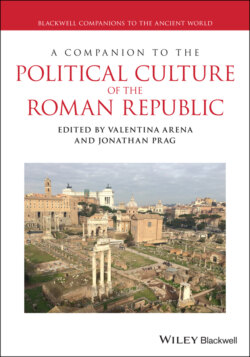Читать книгу A Companion to the Political Culture of the Roman Republic - Группа авторов - Страница 51
4.7 The Revolution
ОглавлениеAssessing the role and function of Roman republican thinking in the revolutionary era is an immensely complex task, if only because most of the political thinkers of the Revolution were at the same time its main protagonists. As a result, the leisured commerce with the ancients that allowed prerevolutionary authors to elaborate subtle, oblique or convoluted critiques of monarchy was obviously not available.
The task is further complicated by the widely divergent assessments of the extent and meaning of the presence of Rome in the revolutionary period. On the one hand, it is widely admitted that the ‘development of the revolutionary spirit’ that had steered French revolutionaries is largely indebted to the ‘cult of Antiquity’ (Parker 1937; Chevallier 1991; for the distinctive juridical aspect of the Revolutionary debt to Rome, see Bouineau 1986), a cult that is traditionally the privileged interpretative key for the Terror (see Hartog 1991), but has also been traced through to a post-Terror version of classical republicanism (Jainchill 2008). On the other hand, several historians have observed a full-scale rejection of the myth of Rome by revolutionaries (Dumont 1994: 18) and argued that the revolutionary debates about citizenship reveal that ‘the Roman paradigm…is categorically dismissed’ (Nicolet 2000: 20–21); more generally, references to antiquity are said to be less the product of proper ‘argument’ than of rhetorical ‘ornament’ (Dumont 1994: 21), the remnants of a classical education rather than serious tools of institutional design.
One of the most persistent obstacles to this issue can be traced back as early as the Leçons d’histoire given by Volney (1799: ii–iii) within the recently established École Normale in early 1795. Since history gives, to Volney’s eyes, the ‘most fruitful sources of [men’s] prejudices and errors’ (232), the ancient (and Roman) references of revolutionaries are but the effect of a blind enthusiasm, responsible for their incapacity to understand that they were pursuing their true goal (the promotion of freedom and rights of men) with counterproductive means (exalting the virtues of ancient peoples and institutions favourable to slavery, to warlike politics hostile to commerce, etc.). But this approach unsatisfactorily makes these worshippers of Livy into straw men, and deters us from trying to understand their intentions when handling these specific ideological weapons (see Chapter 11). The detailed reading of Saint-Just’s trajectory proposed by Linton (2010) provides a convincing alternative standpoint, taking seriously the constitutive role of Saint-Just’s uses of Roman antiquity both in the construction of his revolutionary activity and identity, and in his vision of the new order (see more generally Linton 2004 on this latter aspect; Viarre 1991).
A clear function of Roman republican ideology in revolutionary but still monarchical France was to show how contradictory it would be to claim to be free while still living under a monarch (Hammersley 2010: 41). François Robert, an important early divulger of anti-monarchical ideas in the press and the sociétés patriotiques (Monnier 2005: Chapter 6), tries to convince the Mercure National’s readership that France can do without kingship, and anticipates the official recognition of the King’s status during the first imminent ‘Fête de la Fédération’ (14 July 1790). Aware that challenging monarchy is not topical, Robert nevertheless attacks in the Mercure National (4 July 1790): ‘this word [king] was odious to true Roman citizens’ (quoted in Monnier 2005: 156), meaning that, as revolutionary as the French claim to be, they are not yet free citizens. A few months later, he hammers it in, publishing his Republicanism adapted to France (November 1790) under the auspices of Brutus in order to disclose to his readers the ‘obvious’ ‘incompatibility’ of freedom and monarchy: French people cannot pretend to be free if they live in a monarchy (Robert 1790: i–ii, 3, 1–2). As Robert gradually reveals his uncompromising indictment of monarchy, however, one realises that he clearly does not need a detour via Roman republican heroes. Robert apparently wishes to make the grounds for adapting republicanism to France appear as self-sufficient truths. Yet Desmoulins’ attitude is more representative: well-chosen Roman examples and references are held to be necessary because French subjects are so ‘familiarised with’ the insolence of the royal fiat and the obscenity of monarchical luxury, that they tend to accept meekly their present submission as their political fate (Desmoulins 1789: 50–51). Orotund interpellations of the citizen-reader with the reminder of republican heroes should be seen in this light: ‘Dear fellow-citizens, freedom must be a great good indeed, if Cato tears his entrails to pieces instead of having a king’ (1789: 56). Neglecting such invocations as mere bookish games would amount to missing the normative and practical point Desmoulins is trying to make at the precise juncture of the days following 14 July of 1789: Cato’s gesture is used here to recall an independent truth that should be kept in mind, namely that freedom is a human good worth fighting for and that it might be incompatible with monarchy as such.
More specifically, this ‘populares’ vision of Roman politics (see Arena 2012), in which the people have a crucial and active political role, is invoked as a means to stimulate French subjects towards thinking of themselves as citizens (Desmoulins 1789: 31). The very next day, when the King’s family were arrested while they were fleeing from France (20 and 21 June 1791), the Cordeliers insisted that the Assemblée should collect the opinions of ‘all of the departments’ concerning whether France still ought to be a monarchy. As an important petition of 14 July 1791 put it, it is ‘this character they [i.e. the French people] get from the Romans, this character of freedom’ which makes them demand that the representatives of the nation should not decide anything concerning the fugitive and treacherous King before the ‘commons (communes)’ have pronounced (Mathiez 1910: 113; see Levin 2014: 11–18).
